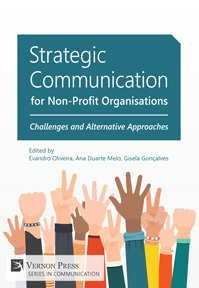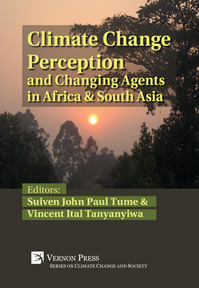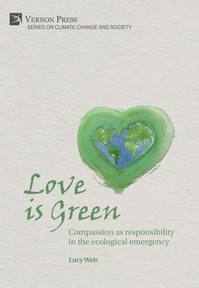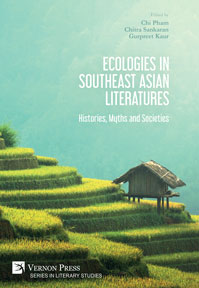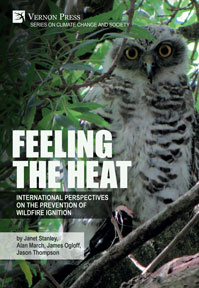Visualizando el Cambio: Humanidades Ambientales / Envisioning Change: Environmental Humanities
Alejandro Rivero-Vadillo, Carmen Flys-Junquera (Eds.)
by Jorge Riechmann (Universidad Autónoma de Madrid, Spain), Inés Villanueva Pérez (Universidad Pompeu Fabra, Spain), Francesco Carpanini , Manuel Ruiz Torres (Instituto Hermes, Spain), Carmen Valero-Garcés (Universidad de Alcalá, Spain), Katharina Maria Kalinowski (University of Cologne, Germany; University of Kent), Lorraine Kerslake Young (Universidad de Alicante), Jing Hu (Universidad de Alcalá, Spain), Montserrat López Mújica (Universidad de Alcalá, Spain), Nuria Cabellos González (EOI Navalmoral de la Mata, Spain), Eni Buljubašić (University of Split, Croatia), José Albelda (Universitat Politècnica de València, Spain), Chiara Sgaramella (Universitat Politècnica de València, Spain), Nuria Sánchez León (CIAE. Universitat Politècnica de València, Spain), Paloma Villalobos Danessi (Universidad Complutense de Madrid, Spain), Javier Mohedano Ruano (IES Averroes, Spain)
Purchase this book
(click here to change currency)
El presente volumen recopila una serie de aportaciones de carácter heterogéneo, que han de ser comprendidas desde una perspectiva holística que nos permita identificar nuevos modos de habitar el mundo. En esencia, los capítulos tejen un nuevo relato cuya finalidad es defender la necesidad de un cambio de paradigma que nos conduzca hacia una realidad sostenible. Al inestimable marco filosófico se le suman varios capítulos que versan sobre la ecopoesía y la traductología, así como aportaciones desde la literatura infantil y juvenil, o aportaciones que superando el eurocentrismo nos muestran propuestas ecocríticas formuladas desde el continente asiático. Cabe subrayar que este tipo de propuestas no suelen estar presentes en compilaciones de índole ambientalista. [...] sin duda alguna supone una aportación de gran valor para las Humanidades Ambientales.
Extract of book review appearing on 'Ecozon@: European Journal of Literature, Culture and Environment', 2022, ISSN 2171-9594. Reviewer: Maite Aperribay-Bermejo
Universidad del País Vasco UPV/EHU, Spain.
The 21st century has been described by many environmental scholars as the one in which humanity will need to face its greatest challenge. The diverse ramifications of the climatic crisis are perhaps the most evident proof of this. This dual-lingual multiauthor volume reflects different perspectives of envisioning an eco-social change towards a more sustainable and just society. Musings on the philosophical implications of utopias, ecofeminism, biopolitics, and biomimicry come together with photography and participatory documentaries.
"Envisioning Change: Environmental Humanities" opens with an essay from one of Spain’s foremost essayists on environmental philosophy, Jorge Riechmann. Literary analyses run from classic myths to oral traditions, including references to frequently neglected traditions such as Bhutan or Croatia, in addition to Spain and the United Kingdom. Rather than emulate theoretical and overarching studies, as several of the recent books on environmental humanities, this volume has many original features, including the abundant references to myths and chapters on eco-translation.
This volume reflects a wide variety of approaches and particularly highlights the search of younger scholars for new approaches to envision a better world. It would hold appeal for scholars, researchers and teachers interested in the environmental humanities from either a philosophical, literary or artistic perspective. Moreover, environmentalists, activists, artists, and local politicians may also be interested in how the humanities can contribute to the wider environmental cause.
El siglo XXI ha sido descrito por muchos académicos medioambientales como el siglo en el que la humanidad tendrá que enfrentarse a su mayor reto, y la prueba más evidente quizás sean las ramificaciones de la crisis climática. Esta colección bilingüe refleja perspectivas diferentes de visualizar un cambio eco-social hacia una sociedad más justa y sostenible. Reflexiones sobre las inferencias filosóficas de las utopías, el ecofeminismo, la biopolítica y la biomímesis se juntan con fotografía y documentales participativos.
“Visualizando el cambio: Humanidades ambientales” comienza con un texto escrito por uno los ensayistas sobre filosofía ambiental más importantes de España, Jorge Reichmann. Los análisis literarios van desde mitos clásicos a tradiciones orales, incluyendo referencias a tradiciones frecuentemente olvidadas como las de Bután o Croacia. En lugar de imitar estudios teóricos y globales como han hecho libros recientes que versan sobre humanidades ambientales, esta colección tiene varias características originales, que comprenden abundantes referencias a mitos y capítulos sobre eco-traducción.
Esta colección refleja una amplia variedad de enfoques; destaca la búsqueda de nuevas perspectivas para visualizar un mundo mejor por jóvenes académicos, y será de interés para académicos, investigadores y profesores interesados en las humanidades ambientales desde puntos de vista filosóficos, literarios o artísticos. Además, ecologistas, activistas, artistas y políticos locales pueden encontrar información sobre cómo las humanidades pueden contribuir a la causa medioambiental.
LISTA DE FIGURAS Y TABLAS/ LIST OF FIGURES AND TABLES
INTRODUCCIÓN/INTRODUCTION
VISUALIZANDO LAS HUMANIDADES AMBIENTALES
ENVISIONING THE ENVIRONMENTAL HUMANITIES
Alejandro Rivero-Vadillo
University of Alcalá, Spain; Instituto Franklin, Spain
Carmen Flys-Junquera
University of Alcalá, Spain; Instituto Franklin, Spain
ENSAYO MARCO/FRAMEWORK ESSAY
NUEVAS ILUSTRACIONES Y MITOS GAIANOS PARA DESPUÉS DEL FIN DEL MUNDO
Jorge Riechmann
Universidad Autónoma de Madrid, Spain
PENSANDO/THINKING
PENSAR EL PROGRESO Y LA UTOPÍA: MIES Y BAUMAN: ¿CONTRAPOSICIÓN DE HORIZONTES?
Inés Villanueva Pérez
Universidad Pompeu Fabra, Spain
THE ECOLOGICAL CRISIS AS A MODERN ISSUE ON A GLOBAL SCALE: A PROBLEMATIZATION BETWEEN POLITICAL ECOLOGY AND BIOPOLITICS
Francesco Carpanini
Independent Scholar
NUESTRO LUGAR NATURAL: SER MÁS HUMANOS
Manuel Ruiz Torres
Instituto Hermes, Spain
INTERPRETANDO/INTERPRETING
UT NATURA POESIS: LA BIOMÍMESIS COMO PRAXIS POÉTICA EN LA OBRA DE JORGE RIECHMANN
Javier Mohedano Ruano
IES Averroes, Spain
¿Y DÓNDE QUEDA LA TRADUCCIÓN EN LAS HUMANIDADES AMBIENTALES? DE LA TRAICIÓN DEL ETNÓGRAFO OMNIPRESENTE EN LA INVESTIGACIÓN TRANSCULTURAL
Carmen Valero-Garcés
Universidad de Alcalá, Spain
ECOPOETRY: TRANS-LATING NATURE
Katharina Kalinowski
University of Cologne, Germany; University of Kent, UK
CONTANDO/STORYTELLING
REVISITING THE MYTH OF PAN: FROM NEVERLAND TO NARNIA
Lorraine Kerslake
Universidad de Alicante, Spain
LA NARRATIVA DE LA DESERTIFICACIÓN DESDE LA PERSPECTIVA ÉTNICA: BANDERA VERDE·GADA MEIREN DE XUEBO GUO
Jing Hu
Universidad de Alcalá, Spain
MITOS Y LEYENDAS ALPINAS: UNA ODA A LA NATURALEZA
Montserrat López Mújica
Universidad de Alcalá, Spain
ANCIENT TALES IN BHUTAN: EXAMPLES OF THE POWER OF LOCAL FOR ENVIRONMENTAL AWARENESS, SUSTAINABILITY AND RESILIENCE - (STORIES WITHIN AN ALTERNATIVE STORY TO HELP US REMEMBER OUR COLLECTIVE RESPONSIBILITIES AND POSSIBILITIES)
Nuria Cabellos González
EOI Navalmoral de la Mata, Spain
(RE)TELLING IT LIKE IT IS: A CROATIAN CASE OF ECOLITERATURE FOR CHILDREN (AND ADULTS)
Eni Buljubašić
University of Split, Croatia
VIVIENDO/EXPERIENCING
CARRÍCOLA, PUEBLO EN TRANSICIÓN: EL RELATO DOCUMENTAL EN LOS PROCESOS DE TRANSFORMACIÓN SOCIAL HACIA LA SOSTENIBILIDAD
José Albelda
Universitat Politècnica de València, Spain
Chiara Sgaramella
Universitat Politècnica de València, Spain
EL PAPEL DEL ARTE EN LA RED DE TRANSICIÓN
Nuria Sánchez-León
CIAE. Universitat Politècnica de València, Spain
TÉMPANOS ANTÁRTICOS Y SU CONDICIÓN SALVAJE COMO MUNDO EMANCIPADO
Paloma Villalobos Danessi
Universidad Complutense de Madrid, Spain
CONTRIBUIDORES/CONTRIBUTORS
ÍNDICE DE TÉRMINOS/INDEX OF TERMS
Alejandro Rivero-Vadillo (University of Alcalá) es graduado en Lenguas Modernas y Traducción y en Estudios Ingleses por la Universidad de Alcalá y Máster en Estudios norteamericanos por la UCM/UAH. En la actualidad es doctorando con beca en Formación de Personal Universitario en la Universidad de Alcalá con una tesis sobre poshumanismo, ciencia ficción y cambio climático. Es miembro del grupo de investigación en Ecocritica GIECO, del Instituto Franklin y de los comités editoriales de Ecozon@. Revista Europea de Literatura, Cultura y Medioambiente y Contrapunto. Revista de Crítica Literaria y Cultural de la Universidad de Alcalá.
Carmen Flys-Junquera (University of Alcalá) actualmente es profesora honorífica de investigación y profesora titular (recién jubilada) de literatura norteamericana en el Departamento de Filología Moderna de la Universidad de Alcalá. Fue Vicepresidenta y Presidenta de la Asociación Europea para el Estudio de la Literatura, Cultura y Medio Ambiente (EASLCE) de 2008-2012, es miembro y fue fundadora y coordinadora del grupo de investigación en ecocrítica, GIECO, del Instituto Franklin y fundadora y Editora en Jefe de Ecozon@. Revista Europea de Literatura, Cultura y Medio Ambiente. Fue co-IP de un proyecto del Ministerio de Humanidades Ambientales y de otro sub-proyecto sobre Ecocrítica y Mitocrítica. Ha organizado numerosos congresos y seminarios de Ecocritica así como editado varios libros y números monográficos de revistas sobre el tema, y dirige la serie CLYMA de la Biblioteca Benjamín Franklin, además de ser autora de medio centenar de artículos ecocríticos.
Alejandro Rivero-Vadillo (University of Alcalá) is a graduate in Modern Languages and Translation and English Studies from the University of Alcalá and holds a Master’s degree in North American Studies from the Complutense University of Madrid/ University of Alcalá of Henares. Alejandro is currently a doctoral student with a scholarship at the University of Alcalá in University Personnel Training, where his thesis focuses on posthumanism, science fiction and climate change. Rivero-Vadillo is a member of Ecocritica GIECO research group of the Franklin Institute and a member of the editorial committees at Ecozon@: Revista Europea de Literatura, Cultura y Medioambiente [The European Journal of Literature, Culture and the Environment] and Contrapunto: Revista de Crítica Literaria y Cultural de la Universidad de Alcalá [The University of Alcalá Journal of Literature and Cultural Criticism]. In addition, he was a member of the organization committee of the I Congreso Internacional de Humanidades Ambientales “Relatos, Mitos y Artes para el Cambio” [The First International Conference on Environmental Humanities “Stories, Myths and Arts to Envision a Change”] in 2018.
Carmen Flys-Junquera (University of Alcalá) is currently Honorary Professor of Research and has recently retired as Associate Professor of North American Literature in the Department of Modern Languages at the University of Alcalá. Carmen was Vice-President and President of the Asociación Europea para el Estudio de la Literatura, Cultura y Medio Ambiente (EASLCE) [European Association for the Study of Literature, Culture, and the Environment] from 2008-2012. Flys-Junquera is the former Founder and Coordinator of the Grupo de Investigación en Ecocrítica (GIECO) [Research Group in Ecocritisism] of the Franklin Institute and Founder and Editor in Chief of Ecozon@: Revista Europea de Literatura, Cultura y Medioambiente [European Magazine of Literature, Culture and Environment]. She was Co-Principal Investigator for a project of the Ministry of Environmental Humanities and a sub-project on Ecocriticism and Myth Criticism. Carmen has organized numerous congresses and seminars on Ecocriticism as well as editing various books and special issue journal issues on the subject, directs the Benjamin Franklin Library’s series CYLMA, and has authored over 50 ecocritical articles.
Environmental humanities, ecomythology, ecocriticism, eco-translation, sustainable arts, oral tradition, ecopoetry, environmental philosophy, political ecology, environmental narratives, degrowth, environmental education, environmental imagination, environmentalism, environmental studies
Subjects
Language and Linguistics
Interdisciplinary
Philosophy
Series
Series in Philosophy
Bridging Languages and Scholarship
Serie en Filosofía
Related services
Find in a library near you Download print-friendly flyer Download sample chapter Download HQ cover Find in Bookshop.org Find this title in AmazonSee also
Bibliographic Information
Book Title
Visualizando el Cambio: Humanidades Ambientales / Envisioning Change: Environmental Humanities
ISBN
978-1-64889-037-6
Edition
1st
Number of pages
272
Physical size
236mm x 160mm

![Visualizando el Cambio: Humanidades Ambientales / Envisioning Change: Environmental Humanities [Hardback]](/file/12364/3408ca4ad9d39aea0d24b83083bc32df/1594800633.jpg)


